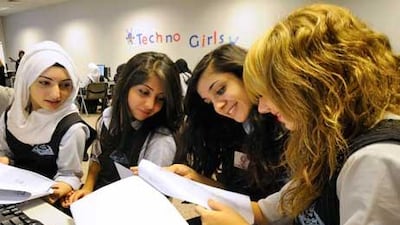DUBAI // Private schools in the emirate have taken an estimated Dh3.52 billion in tuition fees this year, the education regulator says.
Enrolments at private schools have doubled in the past 10 years, exceeding 200,000 pupils for the first time, says the Knowledge and Human Development Authority’s (KHDA) report on the academic year just ending.
The growth coincided with the number of Dubai residents reaching 2 million. A steady local population and influx of expatriates are major factors, the report said.
Authorities also say a rise in the number of Emirati parents preferring to send their children to private schools is a factor.
Pupil numbers at private schools rose by 7.1 per cent in the past year, as fees increased by 4.5 per cent.
The average fee paid for a pupil is Dh17,172 a year, the authority says. About 15 per cent of parents pay more than Dh35,000 a year.
“It’s too much, in my opinion, to educate young children, especially when you have to also spend an additional amount on trips, uniform, lunch,” said a mother with two children at Gems Royal Dubai.
She said the fees had been increased for the next academic year. She will pay about Dh40,000 a year for her child who is in primary school.
She does not receive an education allowance from her company, causing her to rethink schooling him here.
“Our biggest worry is that the school will get the outstanding rating next year and will raise fees again. We will not be able to pay.”
Authorities say total revenue of schools this year increased by 12 per cent from the previous year.
Those numbers did not come as a surprise to parents who have constantly questioned the year-on-year increase in education costs.
KHDA announced a new fee framework in April that allows education providers to push up fees every year, based on a cost index and their rating in inspections.
School operators argue that while the revenue has increased, their operating costs have been growing as well.
They say the need to offer competitive salaries with benefits including housing and career-development programmes to attract the best teachers and to upgrade facilities justifies an increase in the fees.
Two said teacher salaries accounted for between 60 and 80 per cent of their operating costs.
“While there has been a freeze on school fees increases, the average revenue has, nevertheless, risen due to the movement of students to new and existing schools that charge higher fees,” said the report.
It said other factors for the increase in revenue at private schools included pupils moving to higher grades, which are more expensive, and exceptions to the freeze on increases at a minority of schools last year.
Another mother who may enrol her son in Jumeirah Primary School this year said systematic, infrequent increases are acceptable – if they are justified.
“If it’s to improve, then I can pay,” said the mother from Singapore. “But then it needs to be visible improvement. Schools need to show the parents how the additional fee has impacted pupils’ experience.”
Several parents said affordable schools were not of adequate quality or they had a huge demand because of their good performance.
“Most of the good schools have huge waiting lists,” said a parent of a four-year-old pupil. “Some of the schools within my budget and highly recommended are not an option at all.”
UK curriculum schools are in more demand than other systems in Dubai. Pupil numbers at such schools have increased by 22 per cent since the 2008-2009 academic year.
At the same time, pupil numbers rose by 19 per cent in US-system campuses, and 14 per cent in Indian schools. Pupil numbers decreased by 2 per cent in schools that followed the national curriculum.
In July last year, parents of more than 5,000 children were still waiting to find out if they had received admission to a British curriculum school for September. Officials said the scramble was caused by the demand for a certain curriculum.
Clive Pierrepont, the director of communications at Taaleem, which operates a dozen private schools, said many parents trusted the UK curriculum.
“Parents are comfortable with the curriculum because it has been around for many years,” Mr Pierrepont said. “They may have been educated in the system and consider it fit for their children, too.”
He said a lot of UK schools had started to offer a hybrid system, which includes the International Baccalaureate (IB) programme as well.
“Schools following the IB system are catching up in demand,” Mr Pierrepont said.
aahmed@thenational.ae

